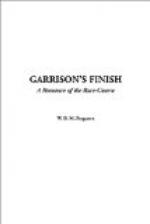“Beloved impostor: ‘Ars longa, vita brevis,’ as the philosopher has truly said, which in the English signifies that I cannot afford to wait for the demise of the reverend and guileless major before I garner the second fruits of my intelligence. Ten thousand is a mere pittance in New York—one’s appetite develops with cultivation, and mine has been starved for years—and I find I require an income. Fifty a week or thereabouts will come in handy for the present. I know you have access to the major’s pocketbook, it being situated on the same side as his heart, and I will expect a draft by following mail. He will be glad to indulge the sporting blood of youth. If I cannot share the bed of roses, I can at least fatten on the smell. I would have to be compelled to tell the major what a rank fraud and unsurpassed liar his supposed nephew is. So good a liar that he even imposed upon me. Of course I thought you were the real nephew, and it horrifies me to know that you are a fraud. But, remember, silence is golden. If you feel any inclination of getting fussy, remember that I am a lawyer, and that I can prove I took your claim in good faith. Also, the Southerners are notoriously hot-tempered, deplorably addicted to firearms, and I don’t think you would look a pretty sight if you happened to get shot full of buttonholes.”
The letter was unsigned, typewritten, and on plain paper. But Garrison knew whom it was from. It was the eminent lawyer’s way not to place damaging evidence in the hands of a prospective enemy.
“This means blackmail,” commented Garrison, carefully replacing the letter in its envelope. “And it serves me right. I wonder do I look silly. I must; for people take me for a fool.”
CHAPTER VIII.
The colonel’s confession.
Garrison did not sleep that night. His position was clearly credited and debited in the ledger of life. He saw it; saw that the balance was against him. He must go—but he could not, would not. He decided to take the cowardly, half-way measure. He had not the courage for renunciation. He would stay until this pot of contumacious fact came to the boil, overflowed, and scalded him out.
He was not afraid of the eminent Mr. Snark. Possession is in reality ten-tenths of the law. The lawyer had cleverly proven his—Garrison’s—claim. He would be still more clever if he could disprove it. A lie can never be branded truth by a liar. How could he disprove it? How could his shoddy word weigh against Garrison’s, fashioned from the whole cloth and with loyalty, love on Garrison’s side?
No, the letter was only a bluff. Snark would not run the risk of publicly smirching himself—for who would believe his protestations of innocency?—losing his license at the bar together with the certainty of a small fortune, for the sake of over-working a tool that might snap in his hand or cut both ways. So Garrison decided to disregard the letter.




